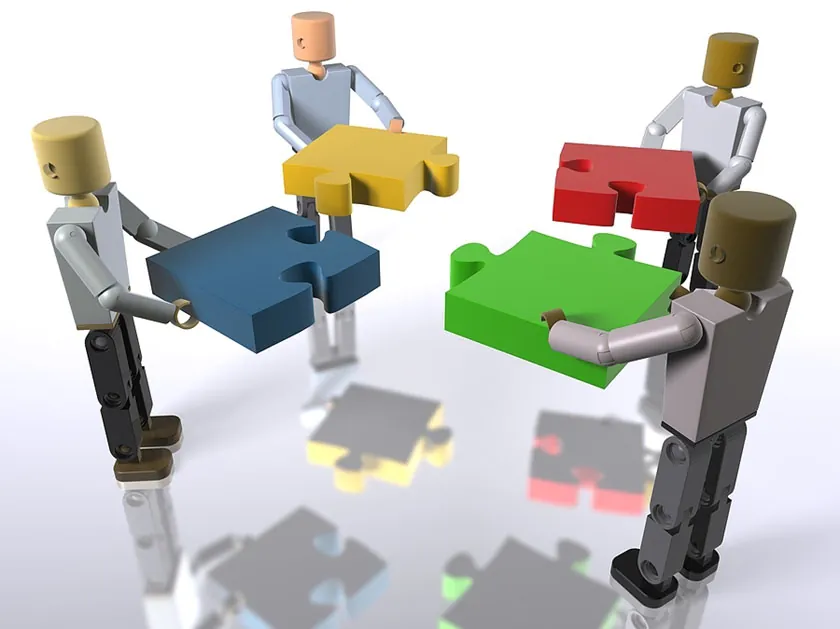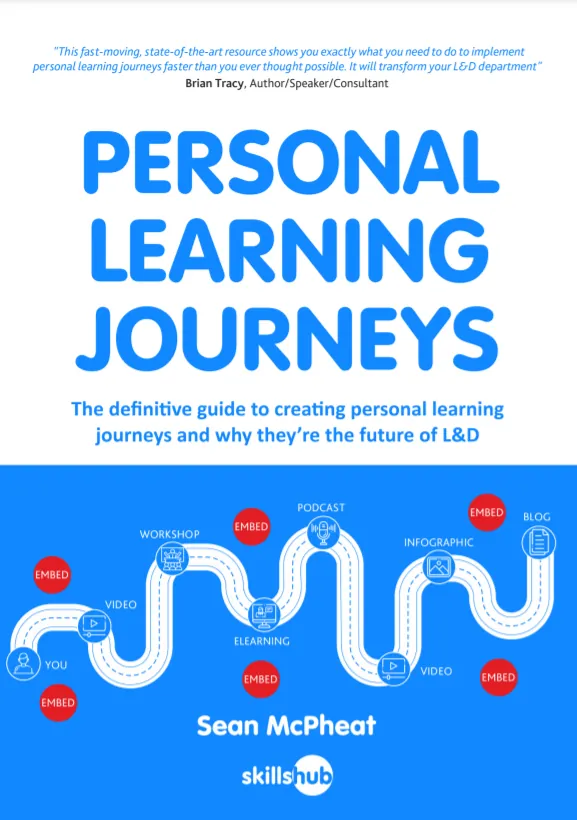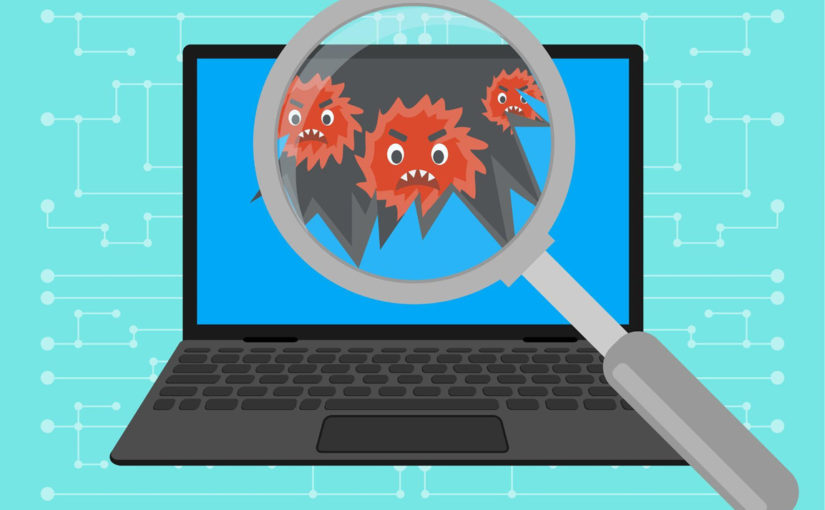
Building relationships at work is not just a social luxury but a professional necessity.
In the UK, a staggering 40 percent of employees admit to not having a best friend at work, with an additional 15 percent desiring one but lacking it. The absence of strong workplace bonds can significantly affect job satisfaction, work quality, and an employee’s longevity in a role. But how does one cultivate these essential connections?
This guide explores the pivotal role of workplace relationships and introduces 10 essential steps to building them effectively. You’ll learn more about the importance of solid workplace relationships, as well as steps that can help you develop them. Let’s dive in!

Learn How To Create Personal Learning Journeys For FREE!
10 Essential Steps for Building Relationships at Work
If you want to build stronger relationships, you must make an effort.
The following are ten strategies that can help you get to know your colleagues on a deeper level, build trust, and improve your connections.
1. Understand the Value of Workplace Relationships
The first step to building better working relationships is understanding why they’re so important. Numerous benefits come from having solid connections and friendships with your coworkers, including the following:
- Improved Collaboration: It’s easier to work together with people you know on a deeper level.
- Increased Productivity: In addition to being easier to work with people with whom you have strong relationships, you’ll also find that you can get more done in less time.
- Improved Morale: Work is generally a better place to be when you genuinely like and have relationships with the other people in your department, on your team, etc.
- Increased Retention: Employees are more likely to stay loyal to the company when they feel connected not just to the work but to the people they work alongside.
- Improved Well-being: Work is a bit less stressful (and a lot more enjoyable) when people enjoy the relationships they have with their colleagues.
- Improved Onboarding and Training: New team members will likely get more out of the employee onboarding process if they A) see that their colleagues like and have good relationships with each other and B) are learning from people who are interested in getting to know them and helping them adapt to a new company culture.
2. Effective and Open Communication
Now that you know more about the advantages strong relationships can offer, you’re hopefully feeling more motivated to create them in the workplace. One of the most effective ways to do this is by prioritising open communication.
Many people think of good communication as being able to express yourself eloquently so that others understand what you’re saying and why you’re saying it. That’s certainly one part of the equation. However, being an effective communicator also involves being an active listener.
When you practice active listening, you listen to someone else with the intention of genuinely understanding them rather than simply waiting for your turn to respond and give your opinion. The following are some tenets of active listening:
- Eye contact
- Leaning in or nodding
- Sitting still and focusing on the speaker instead of multitasking
- Letting the other person finish their thought without interruption
- Giving a person time to respond to the point you made
- Restating what someone just said
- Reflect on someone’s feelings and the intention behind their words
- Asking open-ended questions, such as “How did you come to that conclusion?” or “I don’t fully understand X, can you explain it to me?”
Along with being an active listener, make an effort to be open and honest when speaking to your colleagues. The more transparent you are, the more likely they are to follow your lead.
3. Trust and Credibility
Mutual trust is critical to effective relationships and relation-building. You must have trust in your colleagues, and they must feel confident that they can trust you.
How do you establish credibility and build trust among your coworkers? Active listening and open communication are excellent starting points.
Here are some additional suggestions:
- Ask for and act on feedback: Acting on feedback from others shows that they can trust you to listen and take their feelings/needs into account.
- Delegate and ask for support: When you stop trying to do everything yourself, you show your coworkers that you trust them and think they are capable of doing good work.
- Get to know employees one-on-one: One-on-one meetings give you a chance to learn more about each team member and develop more meaningful relationships.
Remember the importance of being consistent, too. If you regularly put in the effort and show that you’re reliable, it’ll be easier for your employees to trust you and see you as someone they can turn to for support.
4. Appreciation and Recognition
Another tool to keep in mind when you’re trying to build relationships is to show appreciation for your colleagues and recognise their hard work.
People are more likely to stick with a company and do higher-quality work when they know that their efforts are noticed and appreciated. When your team members feel valued, they’ll be more inclined to continue going above and beyond.
Furthermore, creating a culture of regular appreciation and recognition also helps to strengthen morale and establish a more positive workplace for everyone – the kind of workplace where people want to get to know each other and collaborate.
5. Collaboration and Teamwork
Your employees won’t feel motivated to build relationships with each other if there are never opportunities for them to collaborate.
The next time you’re planning a big project, consider assigning tasks to groups of employees instead of giving everyone a separate job to complete. That way, you’re encouraging collaboration and giving people a chance to connect with people they wouldn’t have otherwise spent much time talking to.
If you don’t have regular group brainstorming sessions or meetings to discuss progress on projects, you might want to start holding those more often. Those kinds of gatherings can give people a chance to communicate more openly, ask for help and advice, and share their latest wins.
6. Support and Empathy
If you want to build stronger relationships in the workplace, you must show empathy and provide support.
Empathy involves putting yourself in someone else’s shoes and looking at a problem from their perspective. Say a colleague comes to you expressing frustration after a difficult sales call, for example. Being empathetic would look like actively listening to your team member, acknowledging their feelings, and considering how the situation is affecting them.
Sometimes, all the support someone needs is for an empathetic person to listen to and validate them. In other cases, they need more support. Maybe the employee who’s struggling with their sales calls might need help refining their pitch or improving their approach to cold calls and emails.
If they ask for help, don’t send them to figure things out for themselves. Take the opportunity to collaborate with and coach them instead.
You could also partner that employee with someone else who has been excelling with their sales calls. Have them shadow that person and learn from them – not only are you showing appreciation and recognition with this approach, but you’re also creating a chance for collaboration!
7. Diversity and Inclusion
When you strive to create a diverse and inclusive workplace, you make your office a safe space where people feel comfortable being themselves, opening up, and building relationships with their colleagues.
There are many elements to an effective diversity and inclusion plan, including the following:
- A thorough understanding of the state of your company and people’s unique needs.
- A comprehensive diversity and inclusion training plan that takes people’s learning styles and strengths into account.
- Targeted recruitment that aims to fill significant gaps and empower members of marginalised groups (including those of different races, genders, abilities, and economic backgrounds).
- Specific goals that include clear metrics and targets for the company to meet.
- Regular reviews and assessments to ensure you’re progressing toward your goals and identify areas of the program that need improvement.
Remember that diversity and inclusion help everyone in your organisation, not just those who are part of a minority group. When you show that you care about others feeling included in the workplace, you establish a place where people can be honest, be themselves, and work more closely with one another.
8. Conflict Handling
A healthy relationship is not one without conflict. Instead, it is a relationship in which two or more people know how to navigate conflicts and come out stronger than before.
As you work to build relationships in the workplace, don’t forget to focus on healthy conflict resolution. The better you are at resolving conflicts, the easier it will be to address problems with colleagues and help other team members collaborate more effectively.
Effective conflict handling involves the following:
- Addressing the conflict early, before it has a chance to escalate.
- Actively listening to all parties involved and giving them a chance to share their side.
- Identifying and clarifying perceptions and assumptions.
- Focusing on the specific issue rather than the person (i.e., no personal attacks).
- Using “I” statements, such as “I feel” rather than “You made me feel.”.
- Focusing on the present and future.
- Committing to make changes and avoid repeating the problem.
There’s no avoiding conflict in any relationship, including relationships between coworkers. Whether you’re directly involved in the conflict, or you’re trying to resolve an issue between two or more colleagues, these tips can help you navigate the situation and come to a resolution that benefits everyone.
9. Networking
Networking involves interacting with others and building interpersonal relationships with the goal of sharing and gaining information, creating stronger bonds, etc. Networking – both in person and virtually – gives you and your team members opportunities to develop soft skills, including active listening, empathy, and open communication.
Attending networking events also allows you to start building relationships with people outside of the company (but who could be beneficial to the organisation in some way).
The sooner you start focusing on relationship-building, the better. If people have positive memories associated with you, they might be more inclined to partner with you, respond positively to a sales pitch, apply for a job when your company is hiring, etc.
10. Leadership
Finally, remember that if you want to make positive changes in the workplace, you need to start from the top. If leaders, managers, and other higher-ups show a dedication to building relationships, other employees will follow suit and see that it is a legitimate priority.
As a leader, you have a lot of power, particularly when it comes to improving and changing the company culture. Make sure you’re leading in a way that creates strong relationships.
Relationship-focused leadership involves many of the other steps listed above. For example, if you want your employees to have better relationships with you and each other, start by modelling and encouraging open communication and active listening. It also involves seeking feedback, listening to people’s employee engagement ideas (and any other ideas they might have), and implementing them when possible.
Remember that it takes time to effect change in the workplace, too. You must be consistent in your efforts to model positive relationship-building. The more consistent you are, the easier it will be for people to see that you truly mean what you say and can walk the walk instead of simply talking the talk.
Final Thoughts
Relationship-building at work can be tricky, but it’s too important to write off altogether.
Improved relationships in the workplace can lead to enhanced employee engagement, better employee retention rates, boosted morale, and more. If you want to get more out of your work relationships, start by following the steps shared in this guide.
Don’t forget to work on your soft skills, too. Improving your communication and ability to empathise with others will help you build more profound and longer-lasting relationships at work.
At Skillshub we offer bespoke eLearning and an eLearning platform tailored to meet the unique needs of your organisation and its employees. With our resources at your disposal, the path to learning new skills for relationship-building does not have to be difficult!
Contact us to learn more about how we can assist you in transforming your training and development initiatives. Or, check out our eLearning content today to start developing your skills and making progress toward your goals.













